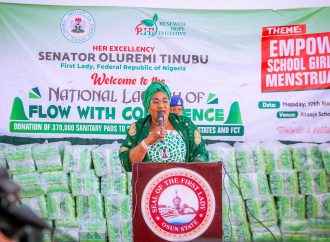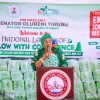Nigeria Spotlighted as Guest Country at 2025 China International Import Expo As the doors opened on the eighth edition of the China International Import Expo (CIIE) in Shanghai, one of Africa’s largest economies, Nigeria, emerged at center stage—honored as the event’s guest country of honour. The recognition marks a major diplomatic and commercial milestone for
Nigeria Spotlighted as Guest Country at 2025 China International Import Expo

As the doors opened on the eighth edition of the China International Import Expo (CIIE) in Shanghai, one of Africa’s largest economies, Nigeria, emerged at center stage—honored as the event’s guest country of honour. The recognition marks a major diplomatic and commercial milestone for Nigeria, placing its products, culture and market potential firmly in view of thousands of global buyers and investors. (CIIE)
The invitation, officially extended by China’s ambassador to Nigeria, Yu Dunhai, emphasized the growing strategic importance that China places on its relationship with Nigeria and reflected Nigeria’s expanding role on the global trade map. (The Guardian Nigeria) The CIIE, which runs from 5 November to 10 November 2025, features around 3,400 exhibitors from 129 countries, and spans some 420,000 square metres of exhibition space at the National Exhibition and Convention Centre in Shanghai. (The Guardian Nigeria)
Deputy Senate President Urges Donald Trump To Withdraw His Threat And Issue Public Apology
Nigeria’s Showcase and Strategic Message
Nigeria’s national pavilion at the expo covers approximately 500 square meters, decked out in its national green and white colors, presenting a wide range of agricultural, manufacturing, and creative-industry products. (The Guardian Nigeria) Among the key items featured are cocoa, cashew nuts, sesame, ginger, bio-fortified cassava, and solar irrigation pumps — all signaling Nigeria’s intent to move beyond being just a raw-material supplier to becoming a value-added exporter. (The Guardian Nigeria)
The message from Nigeria’s delegation is clear: the time has come for Nigerian enterprise to seize global market opportunities. One Nigerian export-promotion official stated, “China’s vast consumer market offers an enormous opportunity for authentic African products. We are here to connect those consumers with Nigeria’s creativity and enterprise.” (The Guardian Nigeria)
Why This Matters for Nigeria
In the broader scheme of things, being guest country of honour carries more than ceremonial prestige. It opens doors to trade deals, exposure to Chinese distribution networks, and deeper industrial linkages. China has reportedly granted zero-tariff treatment to 98 per cent of Nigerian tariff lines under the CIIE framework, a move that could significantly boost agricultural exports such as sesame, ginger and hibiscus tea. (The Guardian Nigeria)
Bilateral trade between Nigeria and China stood at approximately US $22.6 billion in 2024, though Nigeria’s non-oil exports to China remain modest at below US $700 million. The CIIE platform could serve as a catalyst for shifting that balance by elevating the value and volume of Nigerian exports. (The Guardian Nigeria)
Strategic Timing and Broader Implications
The timing of this honour could not be more strategic. It comes shortly after China’s Premier Li Qiang visited Abuja and pledged US $2 billion in concessional loans to support infrastructure and energy initiatives in Nigeria. The honour at CIIE appears as the next phase in deepening Sino-Nigerian ties. (The Guardian Nigeria)
More than trade, the recognition underscores Nigeria’s growing role in global supply chains and Africa-China commercial diplomacy. Chinese observers note that Nigeria’s selection “reflects its expanding role in global trade and its importance to China’s African policy.” (The Guardian Nigeria)
Opportunities and Expectations
For Nigerian companies, the invitation has galvanized preparations. Exporters are navigating registration processes, meeting Chinese quality and safety standards, and exploring collaborations with e-commerce platforms such as Tmall Global, which has already allocated shelf-space for Nigerian products. (The Guardian Nigeria)
In agriculture, the spotlight on high-potential crops like cashew, sesame, cocoa and ginger is expected to drive investment in processing, value-addition and logistics. At the same time, Nigeria’s creative industries — textiles, fashion, design — are leveraging the visibility to attract global buyers and partnerships. According to one media report, the Nigerian pavilion “showcases rich resources, culture … including textiles and emerging industrial products.” (CGTN News)
Challenges Ahead
Of course, taking advantage of this moment demands more than a dazzling pavilion. Nigerian exporters must grapple with infrastructural constraints, logistics bottlenecks, quality-assurance mechanisms, and access to finance. To fully exploit the Chinese market, stakeholders say reforms are needed to strengthen export-readiness and scale up manufacturing capacity.
Moreover, the shift from bulky raw-exports to finished or semi-finished goods requires sustained investment, technology transfer and supply-chain integration. Nigeria’s inclusion as guest country builds momentum, but real gains will hinge on follow-through at home — from improved power supply, transport logistics, to favourable export-finance schemes.
The Diplomatic and Symbolic Dimension
Beyond commerce, the honour carries significant diplomatic symbolism. It highlights Nigeria as a key partner in Beijing’s Africa strategy and underlines the country’s ambition to be a gateway for African goods into Asia. It also sends a message to the world that Africa’s largest economy is ready to book a place in global trade narratives, rather than just being an observer.
For China, spotlighting Nigeria signals a commitment to deepen non-oil trade with Africa and tap into new sources of agricultural and processed goods. As one Chinese commentary put it, Nigerian farm products such as cocoa and cashew are becoming a “golden key” to the Chinese market. (Legit.ng – Nigeria news.)
As the CIIE unfolds, eyes will be on Nigeria’s deal-flow, number of signed MOUs, and actual export orders emanating from this high-profile showcase. A successful performance could inspire other African nations and heighten market confidence in Nigerian goods. Conversely, a failure to convert visibility into contracts may dampen the momentum.
In the coming months, much will depend on how Nigeria’s trade-promotion agencies, private sector and policymakers respond. Will the engagement with China translate into sustained export growth, new manufacturing jobs, and a shift in the trade balance? Will Nigerian brands become recognisable in Asian supermarkets and e-commerce platforms?
For now, Nigeria has taken a prominent place on the global trade stage. As guest country at the 2025 CIIE, it has been handed a platform — one that could serve as a springboard for decades of deeper trade ties and industrial transformation. The challenge now is to turn that platform into lasting economic gains.



















Leave a Comment
Your email address will not be published. Required fields are marked with *